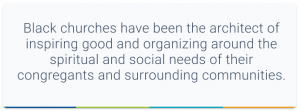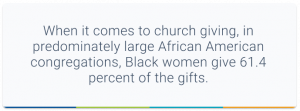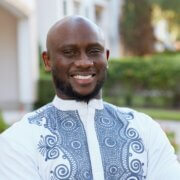Reflecting on the Power of Black Church Giving During Black Philanthropy Month
As Black Philanthropy Month comes to an end, I reflect on how informal philanthropy is often overlooked – giving our time and talent, sending money to our motherlands and giving to our church. Rightly so, the likes of Bill and Melinda Gates, Warren Buffett and George Soros come to mind when we think of philanthropy. Even entertainers like Oprah, Beyoncé, athletes like Magic Johnson and David Ortiz have done so much with their blessings. Just the same, we can’t discount everyday philanthropists like the ones that use Givelify to do more good.
Typically, we link philanthropy to wealth when in actuality, the meaning of it is simply the love for humankind. By definition, philanthropy is goodwill to fellow members of the human race. That’s it! When it comes to expressing this love and goodwill for humankind, I’ve seen the critical role that places of worship, their faith responders and congregants are playing during these current times.
Black Church Giving as a Catalyst for Philanthropy
For many people, especially our Black communities, the genesis of philanthropy and where it grows is in our places of worship. I’ve heard story after story from donors attributing their current generosity practices to their first tithing experience. Placing a dollar bill in the offering plate as a child has been such a memorable experience for many of our donors. And while future generations will remember a joyful tap of button on their mobile device, their church giving experience will always remain as their first introduction to philanthropy and spark doing more good in the world for years to come.
While tithes and offerings do help support staffing and facilities costs, churches are very much responding to the important social needs of their communities as found in the National Study of Congregations’ Economic Practices by the Lake Institute of Faith and Giving. Consider this, 84 percent of congregations provided at least one type of social service. Of those engaged in service projects, 95 percent provided food or clothing, 39 percent addressed physical health needs and 48 percent provide disaster relief.
Historically, Black churches have been the architect of inspiring good and organizing around the spiritual and social needs of their congregants and surrounding communities. This is no different today. We’ve seen COVID-19’s effect on communities of color and how once again, faith responders and their congregants continue to do so much in their communities.

Pastor Aaron Best of St. Matthew Baptist Church in Bridgeport, Connecticut and his congregation are a great testament to this. He recently shared with our team the pandemic’s impact and said, “People can’t pay bills, feed their families and have no jobs. We have seen an increase in social needs in our community, especially for families coming to food banks and pantries.”
Just this month, they partnered with Southwest Community Health Center to provide free COVID-19 testing for the Bridgeport community. He recognizes that the giving from their church members has been key to greater community impact. With their donations, St. Matthew Baptist Church has been able to fund a number of community efforts. It’s amazing to hear about their work in supporting returning citizens. From funding identification needs, providing clothing and oral care, along with resume writing, job search assistance and life coaching skills.
Indeed, the generosity of givers, the everyday philanthropists, has truly prevailed during this critical time. If the last seven years have taught me anything, it is the strength and power of church giving and the philanthropic impact it has in their local communities. If you were to ask church leaders, they call it just carrying out their mission. I wish they would embrace that they are as much philanthropists as any of the celebrity philanthropists we know.
Black Women Are Leading the Way
As we celebrate the strides, we must also celebrate and recognize Black women and their philanthropy. As noted in the 2020 Women Give Report, women give more gifts than men. While their gifts may be slightly smaller on average, they contribute a greater proportion of dollars overall than men. When it comes to church giving, in predominately large African American congregations, Black women give 61.4 percent of the gifts.

Rochelle, a donor who excitedly shared with us that she gave her first tithe at the age of five said, “Giving is a part of my worship to God. It’s a part of who I am.” She also finds herself giving her time as a volunteer and donating her talents by doing leadership training.
On our Givelify app, women contributed 62.6 percent of the gifts with Black female donors being a major driving force behind this number. It is no surprise that they are turning to technology to create a lasting impact, especially in today’s times where many churches were forced to close their doors. Pre-pandemic nearly two-thirds of total online gifts were already coming from women.
Rochelle added as it relates to her mobile giving preference, “I don’t carry cash so instead of stopping at a bank, it makes it easier to give. If I’m not there that Sunday, it just makes it more convenient. I don’t miss a beat. I don’t want to hold on to it until the next Sunday.”
Embracing technology, as shown in our recent Giving in Faith study, has proven to be a saving grace for many churches. Worshipers have not only been able to remain connected to their services but also engaged to all the good their place of worship is doing in their community.
Cultivating Informal Philanthropy
Church giving, remittances and contributing one’s time and talent are significant forms of philanthropy. The power and impact of individuals giving to and through their churches should not be discounted. If anything, it is an opportunity to foster this culture of giving and embrace that Black communities are changing the limited perception of philanthropy.
I’ve always believed that every individual has the power to do good. I’m not surprised that Givelify nears a $1 billion milestone of processed donations this year. The very institutions that are the bedrock of social justice and social needs in our communities need our help the most during these critical times. I beam with pride knowing that everyday people are creating impact just like any billionaire. Their generosity is truly inspiring.
As we reflect on Black Philanthropy Month, let’s recognize the power of the everyday generous giver, let’s celebrate Black giving, and more importantly, let’s expand philanthropy to be inclusive of our Black communities that are doing good one simple joyful gift at a time. By cultivating a new culture of philanthropy, we allow each individual to be seen and ultimately, we are creating a ripple effect of collective and boundless generosity.



